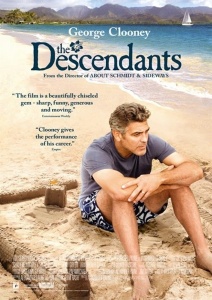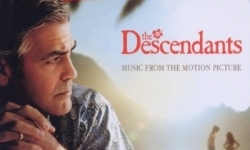Guest author Charles Gustine, co-founder of the novel pop-culture podcast Culture Conquistadors and aspiring film critic with a passion for pop-culture, brings us a deepened understanding of the “conflict of interest humanity has tried to navigate for centuries, with only, (I’m certain), fleeting success.”
 What is that conflict and why does it endure so?
What is that conflict and why does it endure so?
“When we feel most loved, when we feel safest, we are also our most prone. And yet we seek that dangerous dichotomy out constantly, making it a life goal.”
Gustine examines this ‘dangerous dichotomy’ and what he refers to as “The Contradictions of Love” through his rigorous analysis of Alexander Payne’s film The Descendants. Closely surveying film could help us map the roots of conflict, especially familial conflict – do you agree with Gustine’s observations?
“My love, my friend, my pain, my joy”: The Contradictions of Love in The Descendants
by Charles Gustine
Matt King leans tenderly over his wife, planting a plaintive kiss on her unmoving lips. These next words are the last he will ever say to Elizabeth. She will not hear them – machines have been keeping her alive for a month, and today, as per her living will, they will be shut down. Matt manages to choke out the following whispered farewell, his voice breaking, a single tear streaking down his nose:
“Goodbye my love, my friend, my pain, my joy. Goodbye, goodbye, goodbye.”
Not to break the somber mood or anything but… one of these things is not like the other. And yet, for anyone who has felt love – not just a love of passion for a spouse or a significant other, but the unconditional love reserved for family, for brothers and mothers, daughters and sons – there is nothing out of place about Matt King’s mention of pain in his final profession of love. Pain and love are in direct conflict at all times in Alexander Payne’s 2011 drama about a wealthy Hawaii lawyer who must get his affairs – or, more appropriately, his wife’s affair, singular – in order before the plug is pulled on his unfaithful spouse. The two are inextricably linked, interchangeable: love is pain, pain is love. There cannot be one without the other; when we try and pretend otherwise, both fade into an all-encompassing numbness: no pain, but also no love.
As Payne and star George Clooney (who has never looked more haggard or despairing) make clear, to love is to be vulnerable. To be vulnerable is to open oneself up to the potential for pain. This is a conflict of interest humanity has tried to navigate for centuries, with only, I’m certain, fleeting success. The conflict: when we feel most loved, when we feel safest, we are also our most prone. And yet we seek that dangerous dichotomy out constantly, making it a life goal. The Descendants is a film about opening oneself up to existing completely in that state of conflict, even if (even when) it hurts to be that, well, open – open to conflict, open to heartbreak, open to stress, open to life.
The main characters that we follow as they hop from island to island (and from fragile emotional state to even more fragile emotional state) are transformed by one bombshell revelation from armored shells, saying and doing only what it takes to get through the day, into open wounds, feeling more pain than they have in years, maybe more than they ever have; but also, ultimately, feeling more love, more compassion, more understanding. During the week that they live with the knowledge that Elizabeth is doomed – still there technically, but absolutely certain to be gone – the King family shouts, they curse, they accuse and wallow and bring each other to tears. One could argue they exhibit deeply unhealthy behavior considering the person over whom they flail and fist-fight is almost a non-entity, a corpse in everything but beating heart by the film’s second minute. And yet, by the film’s last minute, those same characters might be more content than they can ever remember being. They seem, as they eat ice cream to the soothing purr of Morgan Freeman’s voice, completely at peace. Clearly, they experience some sort of catharsis, but how?
“The Descendants is a film about opening oneself up to existing completely in that state of conflict, even if (even when) it hurts to be that, well, open – open to conflict, open to heartbreak, open to stress, open to life.“
When we meet the members of the King family, it is clear they are all (with the exception of Scottie, who wants desperately to “express herself” but is releasing her frustration in ways that make others uncomfortable; not inwardly towards her family, but publicly, by bullying, grandstanding, and throwing lawn chairs into swimming pools) holding something back, no one more so than the family’s calm, dignified patriarch. Matt is an unconfident, isolated man hiding behind a busy law practice. His connection to his family is that he provides for them, not much more. He recognizes that he is “the backup parent, the understudy.” He hasn’t spoken to his wife in three days when she falls into a coma, but, he admits readily, they really haven’t spoken in months. Matt describes his family poetically when he says ““My family seems like an archipelago. We are part of the same group, but we are still islands – separate and alone. And we’re slowly drifting apart.”
 Matt has become who he is when we meet him because our protagonist is, to his very core, an appeaser. If he has any issues, he keeps them tucked deep beneath his flower-clad shirts, wearing an armor of amiable passivity. The first lesson we see him impart to his young daughter Scottie may as well be his credo: “We don’t share personal stuff with strangers. What goes on with your mom is private.”
Matt has become who he is when we meet him because our protagonist is, to his very core, an appeaser. If he has any issues, he keeps them tucked deep beneath his flower-clad shirts, wearing an armor of amiable passivity. The first lesson we see him impart to his young daughter Scottie may as well be his credo: “We don’t share personal stuff with strangers. What goes on with your mom is private.”
Even though some conflict and pain is inevitable when one finds out a loved one will soon die, Matt holds out as long as he can, repeatedly demurring in conversation after conversation. (Before he discovers his wife’s affair, we see repeatedly that Matt is a man who will say or do anything if it means he can avoid conflict.) Which brings us to Matt’s first confidant, his teenaged daughter Alexandra, a haughty attitude in a bikini who acts tough but can’t be alone for more than three minutes and who, over the years, has come to pity her busy, distant father more than anything else. Their love is one which has turned icy and cumbersome. It is unconditional, yes, but poorly maintained, like a pool with no one to clean it. Watch as they talk around each other by that family pool, filled with debris, uncared for and untended: these two likely haven’t seen each other in months, and yet they have almost nothing to say to each other. Matt has no idea how to relate to Alex, even when he desperately needs to tell her something critical; Alex, who has inherited from her father an ability to hide her emotions behind a fun-time gal exterior, has no real desire to connect with Matt, turning the conversation to everything and anything but the King family and its issues.
It is only once Matt finally tells Alex what he has been trying unsuccessfully to say all day – that Elizabeth will soon die, that only days remain until the plug is pulled – that a vent opens, letting some air into the vacuum that exists between father and daughter. This is needed, it will be cathartic, but, as we will see over the next hour of the film, it will be painful. It will not be as easy as pulling off a Band-Aid; it will be more like a volcanic explosion, a seismic event like the one we see when Alex submerges herself underwater and, only when she is unseen and unheard, weeps. This seems to be how Alex has processed pain until now, bottling it in, keeping it private, between her and the water molecules, but once inside the house, faced with her father’s pitiable cluelessness, she finally shares, unleashing herself and all the secrets she has kept.
What comes out (an admission that she has known for months that Elizabeth was having an affair and was waiting, like so many characters, until things changed to act) is like acid; it spills out of Alex, who has been burned by it too long, coating Matt, who runs frantically, as if in immense pain, to Kai, who breaks out crying when Matt tells her she has been putting “lipstick on a corpse,” a fitting metaphor for everything that happens in this film. Kai’s response to Matt’s repeated entreaties to reveal Elizabeth’s lover embodies this film’s essence in one angry retort: “How can you ask about him when she’s going to die, who cares?” The answer is both “nobody” (everyone has the perspective to understand that nothing they do can save Elizabeth and that her death is the most important thing happening right now) and “everyone.” Everyone cares, no one more so than Matt.
“The two are inextricably linked, interchangeable: love is pain, pain is love. There cannot be one without the other; when we try and pretend otherwise, both fade into an all-encompassing numbness: no pain, but also no love.“
Matt has quickly gone from feeling safe within the confines of his family (too safe, to the point of reticence) to feeling completely prone. In this moment, and through much of the rest of the film, Matt feels more pain than anything else – he feels betrayed by the trust he put into his union with Elizabeth, and Elizabeth being physically incapable of answering for this betrayal will not stop him questioning it. “Isn’t the point of marriage to make your partner’s way in life a little easier?” he shouts at Elizabeth (along with many other, much saltier, things) when he has a moment alone with her. “For me it was always harder with you, and you’re still making it harder!”
This bedside confession is the mirror image of the tender moment he and Elizabeth will share at the end of the film, and The Descendants’ middle passages explore the journey Matt must go through in order to reach the clarity and acceptance that allows him to admit, in his final words to Elizabeth that, in addition to being his pain, she was also his love, his friend, and his joy. Critical in this journey are the two characters that follow him every step of the way – the shockingly mature Alex and her (seemingly) platonic friend Sid, an idiot savant of confrontation who always says exactly what’s on his mind and is as likely to get punched in the face as he is to bring about positive change.
Alex King proves the be the real hero in Payne’s film – no one in the Hawaii Payne crafts is perfect, far from it actually, but as we peel back layers on Alex’s tough, rebellious veneer, we see that she is the ideal embodiment of an approach to life this film seems to espouse. Once she admits that many of her issues stem from the fact that she fears she is like her mother (a similarity which must have startled the teen when she encountered Elizabeth’s infidelity) we see many positive aspects of Alex: she is frank and confrontational, but always with a purpose; she is responsible and nurturing, capable of discretion and maturity that should be impossible in some of the situations she is put in; and she becomes her father’s most trusted confidant during a difficult time, overhauling a relationship that had seen both parties hiding from each other only days before.
More than anything else, The Descendants shows us that Alex has a lot to teach her father, not the other way around. When Matt spanks Alex for yelling at her mother (as he had done only a minute before) it feels ridiculous and hypocritical. “You have no right to talk to your mother that way,” Matt lectures. “I have every right to talk to my mother that way! I’m angry at her,” Alex hisses back. This is the push and pull of The Descendants: decorum (and Matt’s innate passivity) dictates that outside of private moments, only the right things should be said, but human nature doesn’t work that way.
Repeatedly characters as diverse as Troy, Brian’s wife, and Kai confront their demons by making arguments to an obviously unmoved audience. They don’t do it to change the other person’s mind since it is far too late for that; they do it for the sake of argument itself, because the only way people can grow and change is by persevering through conflict, by recognizing their mistakes, and by potentially having other people call them out on them and recognize them as flawed human beings. The refreshing honesty Scottie, Sid, and Elizabeth’s grieving father bring to the table throughout the film may make Ryan and Alex (and the audience) deeply uncomfortable, but what doesn’t kill these characters makes them stronger. Matt becomes stronger, ceasing to be the monster we see in the Kai confrontation (a justified monster, but still monstrous) and becomes remarkably honest but in the right ways as his quest to find answers and honor before time runs out on his wife’s life takes on multiple dimensions.
This resonates in the film’s the deeply symbolic subplot, in which Matt also has a legal obligation to let a piece of his family go – in this case the 25,000 acres of untouched land which his family must sell within seven years. It is only once Matt decides not to sell the Kauai property – to actively fight the consensus, fight his family (who threatens to sue), fight the law – that we realize Matt has changed for good. Holding on to that land is not the easy way out. Matt will be met by cheers from thousands of islanders who dreaded the idea of another resort; but he will also face immeasurable obstacles. But it is the decision itself, the decision to “put lipstick on the corpse” that is this tract of vulnerable land, that is the surest sign that the Matt we see hovering over his wife, accepting all the love and all the pain she has brought, is a different man from the passive shell we met two hours prior.
Matt will soon let Elizabeth go, but we see that in the future he is more likely to fight for what he loves, even if it means a confrontation will ensue. In doing so he opens himself up to pain, to vulnerability, and to heartache, yes; but he also opens himself up to love, to friendship, and to joy. Together, these things comprise all the aspects of a life fully-lived, a life Matt King, who is prepared to nurture his daughters and his islands, might now have.





